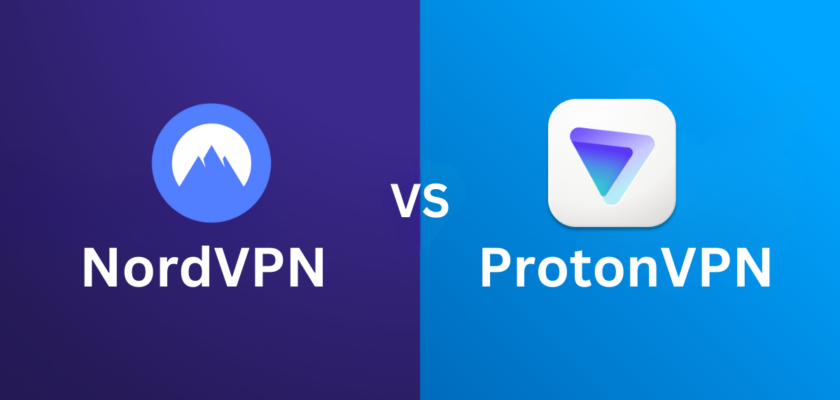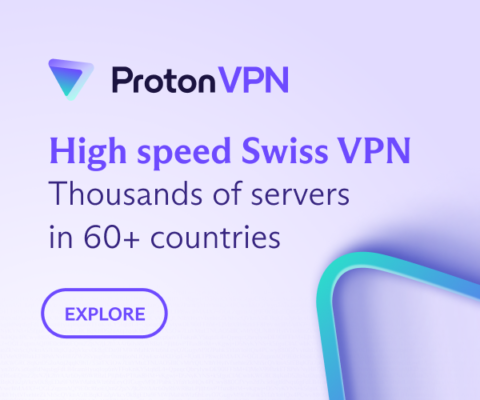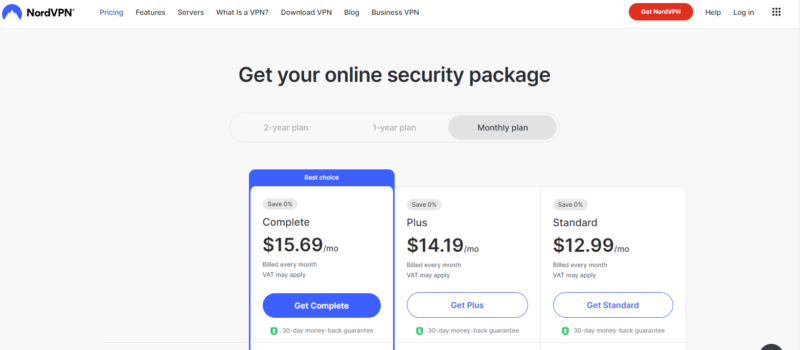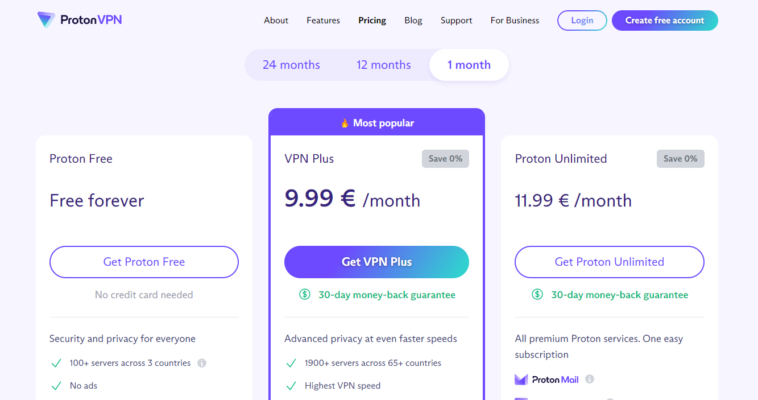Introduction
In today's digital age, internet security is of utmost importance. With increased online activities such as shopping, banking, and social media usage, the need for online security has never been more critical. Virtual Private Networks (VPNs) have emerged as one of the most effective ways to enhance online security, as they provide a secure and private connection between a device and the internet. NordVPN and ProtonVPN are two of the most popular VPN providers on the market, and in this article, we will be comparing and contrasting NordVPN vs ProtonVPN including their features, security, and performance to help you choose the best VPN for your needs.
What is NordVPN?
NordVPN is a Panama-based VPN service that offers high-speed connections, advanced security features, and a user-friendly interface. It has been in operation since 2012 and has a user base of over 14 million people worldwide. NordVPN has over 5,500 servers in 59 countries, making it one of the largest VPN networks globally.
What is ProtonVPN?
ProtonVPN is a Swiss-based VPN service that focuses on providing maximum security and privacy for its users. It is a relatively new VPN provider, having been launched in 2017 by the makers of the secure email provider, ProtonMail. ProtonVPN has over 1,300 servers in 55 countries, and it offers a range of features that cater to users who prioritize security and privacy.
Importance of VPN features, security, and performance
When it comes to choosing a VPN provider, there are several factors to consider, including VPN features, security, and performance. VPN features refer to the additional tools and services that VPN providers offer to enhance the user experience, such as server locations, simultaneous connections, and device compatibility. Security, on the other hand, refers to the measures VPN providers take to protect user data, such as encryption standards, server protocols, and a no-logging policy. Performance refers to the speed and reliability of the VPN connection, which can affect internet browsing, streaming, and gaming.
This article will provide a comprehensive comparison of both VPNs' features, security, and performance. By the end of this article, you will have a clear understanding of the strengths and weaknesses of each VPN provider, enabling you to make an informed decision about which one is right for you.
VPN Features
- Number of servers
NordVPN has a significant advantage over ProtonVPN. NordVPN boasts over 5,500 servers in 59 countries, providing users with a wide range of options to choose from. This large number of servers means that NordVPN can offer faster speeds and better connectivity, making it an ideal choice for users who frequently travel or need to connect to servers in different locations.
ProtonVPN, on the other hand, has over 1,300 servers in 55 countries, which is still a relatively impressive number, considering it is a newer VPN provider. However, it may not be enough to provide the same level of server availability and connectivity as NordVPN.
- Device compatibility
Both VPNs offer excellent device compatibility, ensuring that users can protect their online activities across a wide range of devices.
NordVPN supports most major platforms, including Windows, macOS, iOS, Android, and Linux. It also offers browser extensions for Google Chrome and Firefox, as well as support for routers, smart TVs, and gaming consoles.
ProtonVPN is compatible with Windows, macOS, Linux, iOS, and Android, and also offers browser extensions for Chrome and Firefox. However, ProtonVPN does not support as many devices as NordVPN, and it does not offer router support.
- Simultaneous connections
NordVPN allows users to connect up to six devices simultaneously, which is more than enough for the average user. This means that you can use NordVPN on your laptop, phone, tablet, and other devices all at once.
ProtonVPN, on the other hand, only allows users to connect up to five devices simultaneously, which may be limiting for some users. However, ProtonVPN offers a unique feature called Secure Core, which adds an additional layer of security to your connection by routing your traffic through multiple servers, making it more challenging to trace your online activities.
- Additional tools and services
Both VPNs offer additional tools and services that enhance the user experience.
NordVPN, for instance, offers a CyberSec feature that blocks ads and malicious websites, as well as a Double VPN feature that encrypts your data twice, providing an extra layer of security. NordVPN also has a SmartPlay feature that allows users to stream content from popular streaming services like Netflix and Hulu, even if they are not available in their country.
ProtonVPN, on the other hand, offers a Secure Streaming feature that allows users to access geo-restricted content from popular streaming services. Additionally, ProtonVPN offers a Tor over VPN feature, which allows users to access the Tor network while also using a VPN, providing even more anonymity and security.
- Server location
Both VPNs have an extensive network of servers located in different countries, making it easy for users to connect to servers in locations that suit their needs. However, NordVPN has a more extensive network of servers, with servers located in 59 countries, while ProtonVPN has servers in 55 countries.
The location of servers can affect the speed and reliability of your VPN connection, so having a vast network of servers in different locations is an advantage for VPN providers. NordVPN's larger network of servers means that users have more options when it comes to connecting to servers that provide the best speeds and reliability.
VPN Security
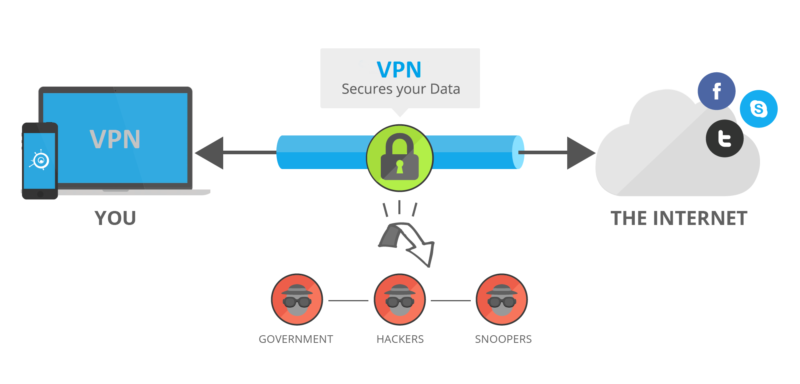
- Server protocols
Both VPNs offer a range of server protocols, allowing users to customize their VPN connection based on their needs.
NordVPN offers protocols such as OpenVPN, IKEv2/IPSec, and NordLynx, a proprietary protocol that offers fast speeds and strong encryption. NordVPN also allows users to choose their protocol based on their device and internet connection.
ProtonVPN offers OpenVPN and IKEv2/IPSec protocols. However, ProtonVPN also offers a unique feature called Secure Core, which adds an additional layer of security by routing your traffic through multiple servers, making it more difficult to trace your online activities.
- Encryption standards
Encryption is an essential aspect of VPN security, as it ensures that your online activities remain private and secure. Both VPNs offer military-grade encryption, ensuring that your data is protected from unauthorized access.
NordVPN uses AES-256 encryption, which is the same standard used by government agencies and security professionals. ProtonVPN, on the other hand, uses AES-256 encryption for data encryption and RSA-2048 for key exchange, providing a high level of security.
- DNS leak protection
DNS leaks can occur when your VPN connection is not properly configured, resulting in your DNS requests being sent through your ISP instead of your VPN provider. Both VPNs offer DNS leak protection, ensuring that your DNS requests are always routed through your VPN provider.
- Kill switch
A kill switch is an essential feature that ensures your internet connection is automatically cut off if your VPN connection drops. This prevents your online activities from being exposed to your ISP or other third parties. Both VPNs offer a kill switch feature, providing an extra layer of security for their users.
- No-logging policy
Both VPNs have a strict no-logging policy, meaning they do not store any user data or online activities. NordVPN's privacy policy states that it does not collect any user data, except for email addresses and payment information. ProtonVPN's privacy policy also states that it does not log any user data, except for the timestamp of the last successful login attempt and the total number of simultaneous connections.
VPN Performance
- Connection speed
One of the most critical factors when it comes to VPN performance is connection speed.

NordVPN offers fast connection speeds, thanks to its proprietary NordLynx protocol, which is optimized for speed and reliability. NordVPN also has a vast network of servers spread across multiple countries, providing users with a high-speed connection wherever they are located.
ProtonVPN also offers fast connection speeds, thanks to its advanced routing technology and optimized server infrastructure. However, its server network is relatively smaller than NordVPN's, which can sometimes result in slower speeds during peak usage hours.
- Server availability
The availability of VPN servers is also an essential factor when it comes to VPN performance.
NordVPN has an extensive network of over 5,500 servers in 59 countries, providing users with a high level of server availability and fast connection speeds. NordVPN also offers specialized servers for specific purposes, such as P2P file sharing, Onion Over VPN, and Double VPN.
ProtonVPN, on the other hand, has a smaller network of servers, with around 1,200 servers in 55 countries. However, ProtonVPN also offers specialized servers for specific purposes, such as Secure Core and Tor over VPN, providing users with a high level of security and anonymity.
- Bandwidth usage
VPN bandwidth usage is another crucial factor to consider when evaluating VPN performance. Both VPNs offer unlimited bandwidth usage, allowing users to stream, download, and browse without any restrictions. NordVPN also offers a feature called CyberSec, which blocks ads, malware, and other online threats, resulting in lower bandwidth usage and faster speeds.
- User reviews
User reviews are an excellent way to gauge the performance and reliability of a VPN service. Both VPNs have received positive user reviews, with users praising their speed, security, and ease of use. NordVPN's user reviews also highlight its extensive range of server locations and specialized servers for specific purposes, while ProtonVPN's user reviews highlight its no-logging policy and advanced security features.
VPN Pricing
When it comes to choosing a VPN service, pricing is an essential factor to consider. Both VPNs offer multiple pricing plans, allowing users to choose a plan that suits their budget and needs.
NordVPN pricing plans
NordVPN offers four pricing plans:
- Monthly plan: $11.95 per month
- One-year plan: $4.92 per month (billed annually at $59.00)
- Two-year plan: $3.71 per month (billed every two years at $89.00)
- Three-year plan: $3.30 per month (billed every three years at $125.64)
All NordVPN plans come with a 30-day money-back guarantee, allowing users to try the service risk-free.
ProtonVPN pricing plans
ProtonVPN offers four pricing plans:
- Free plan: Offers limited features and server locations
- Basic plan: $5.00 per month
- Plus plan: $10.00 per month
- Visionary plan: $30.00 per month
All ProtonVPN plans come with a 30-day money-back guarantee, allowing users to try the service risk-free.
Comparison of pricing plans
In terms of pricing, NordVPN's plans are more affordable than ProtonVPN's plans, with its two-year and three-year plans offering significant discounts. However, ProtonVPN's free plan allows users to try the service before committing to a paid plan, which can be a significant advantage for budget-conscious users.
Conclusion
After a thorough comparison of NordVPN and ProtonVPN's features, security, performance, and pricing, it's clear that both services have their strengths and weaknesses. Both VPNs are excellent VPN services that offer top-notch features, security, and performance. Ultimately, the choice between the two services comes down to the user's specific needs and preferences. For users who prioritize affordability and additional tools and services, NordVPN is a great choice. For users who prioritize privacy and a free plan, ProtonVPN is a strong option.

